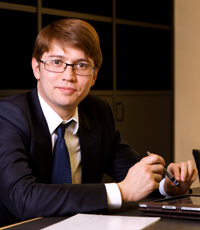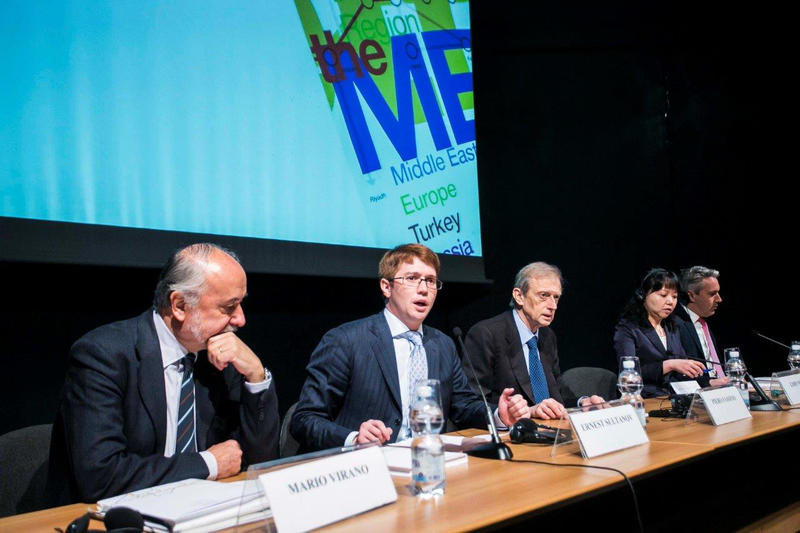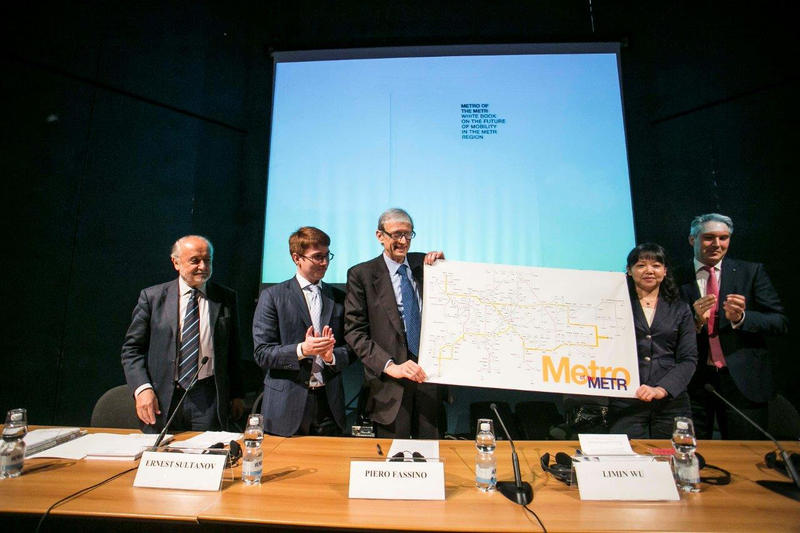About

Ernest Sultanov
I’m often asked what the METR region stands for. I should admit that besides all the geopolitical context (METR - Middle East, Europe, Turkey, Russia – is a heartland of Eurasia) there is something very personal in all this. My university and PhD time was a time of deep study of International relations with a special focus on the Middle East. Roman history is printed in my mind and I spent many years of my career in Europe. I’m linked to Turkey not only because of my Tatar origins, but also because its recent history is a rare success story in the Islamic world. And of course Russia is the country where I was born and raised.
In 2012 together with my cross-cultural team we founded MIR-initiative. The name reflected our belonging to the METR area with three letters symbolizing also the three important capitals of the region – Moscow, Istanbul, Rome. It also expressed our interest in creating a vision for the region – the word "mir" in Russian has a multiple meaning: it means "peace", "world", but also "vision".
The first event organized by MIR-initiative was a conference in the Italian parliament called “Bridging the new Middle East”. This was an attempt to work with the politicians and business leaders from within the METR region on new ideas for the future.
Then I was attracted by a true challenge in Russia – a high speed railway project with more than 10 thousand kilometers scheduled to be constructed in the next 15 years. This gave me an important opportunity to discuss the MIR-initiative with the key people from the transport and communication industry. They supported the idea of working together to elaborate the conceptual basis for the future of transport, communications and infrastructure in the METR region. 28 authors participated in preparation of the first edition of the MIR White book "Metro of the METR region".
Personally I believe that creation of common infrastructure is certainly a key factor in promoting a sustainable model of development in the world today. Social mobility, security and economic upliftment find their base on trasportation mobility and presence of infrastructure and communications permitting the fast passage of people, goods and ideas.
MIR White book laid a foundation for the Eurasian high-speed metro (heir to the ancient system of integrated mobility - the Silk Road). Within the future high–speed metro the crucial role had to be plaid by the cities as stations and as a consequence by the their mayors. This is how and why the Railway Silk Road Cities Forum was launched.
Leadership
Ernest Sultanov is the Coordinator of MIR Initiative.
He is a lawyer and manager with extensive practice in company restructuring and realization of Public-Private Partnership projects focused on Europe and Russia. As Head of External Affairs and International Development of High Speed Railways (Russian Railways) he was responsible for launching the Eurasian High-Speed Corridor Moscow-Beijing project. He formerly was Head of Legal for European steelmaker Lucchini S.p.A. (Severstal Group).
Mr. Sultanov is also a writer and columnist at the major Russian newspapers Kommersant, Vedomosti and The Moscow Times.
He holds a PhD from the Moscow State University of International Relations and an MBA from the Milan Polytechnic Institute and Sant’Anna School of Advanced Studies.
Jan C. Harder is the Chairman of the Steering Committee of MIR Initiative.
Mr.Harder is also a Vice President Sales and Supply Chain Management of Molinari Rail Group, Switzerland. Before joining Molinari Rail he was working in different management positions with Alstom Transport as Vice President Business Development in the CIS Region of Alstom Transport responsible for systems, infrastructure and signalling business from 2012 to 2015. Before he was working within Siemens AG, Germany and Siemens LLC, Russia in the Postal Automation, Airport Infrastructure and Rail Systems. He has an extensive experience in Sales, Strategy, Supply Chain Management and Legal. Since 2012 he was Customer Director for Russian Railways with a special focus on the Very High Speed development in Russia. Mr. Harder is participating in international expert panels, forums and conferences in Rail market as a key speaker and expert and initia ted cooperation with Moscow Railway Engineering University to improve education of new Railway talents of the future. He has been member of Committee for strategic Issues of the Russian Non-profit partnership "Union of industries of Railway Equipment" (NP "UIRE") (www.opzt.ru), member of the WIrtschaftsclub Russland and the Rotary Club Moscow International.
Why we are doing this?
 MIR initiative’s White book project comes into play as a platform for decision makers, intellectuals and philosophers to discuss all the key issues related to the future of the METR (Middle East, Europe, Turkey, Russia) region transport and infrastructure integration and the ways to make it happen. Anything that can be done to create a new transport infrastructure, raise the system communication level and boost social mobility brings social justice to millions of people.
MIR initiative’s White book project comes into play as a platform for decision makers, intellectuals and philosophers to discuss all the key issues related to the future of the METR (Middle East, Europe, Turkey, Russia) region transport and infrastructure integration and the ways to make it happen. Anything that can be done to create a new transport infrastructure, raise the system communication level and boost social mobility brings social justice to millions of people.
Transport/communication and social mobility are becoming more and more interconnected and interdependent in the context of the METR region development.
A person living in an area with high-end infrastructure enjoys far brighter social advancement prospects than those “on the outside” of the transport system.
The off-the-scale crisis tension in the METR region is caused significantly by the fact that transport/communication mobility and thus social advancement prospects are distributed unevenly there. It is impossible to bring peace and stability to Middle East when locals have to face “mobility inequality”, just as it is impossible to stop the stream of undesirable immigrants moving to Europe in search of new opportunities.
A long-term solution for this issue cannot be based on military operations, air strikes or escalating sanction programs. The problem can only be solved by creating new conditions that would boost overall transport mobility as opposed to serving only the chosen few.
Today it’s the transport and communication mobility that determines social mobility and in the end works as the most visible expression of freedom.
METR region transport mobility increase will thus naturally result in higher social dynamics and potentially more just socio-economic welfare distribution in the area, leading to lower extremism and proneness to conflict levels. It will be easier and more comfortable for people to see their neighbors as partners in productive values, ideas, information and goods exchange, not as latent enemies or potential competitors.
 Socio-economic and transport/communication mobility are inversely proportional to the risk of inacceptable and conflict behavior: i.e. the higher system mobility a region features, the less likely it is to see a crisis or conflict break out. A common transport system in constant development unhindered by any walls or barriers is the most important factor that allowed Europe to decrease the chance of internal clashes.
Socio-economic and transport/communication mobility are inversely proportional to the risk of inacceptable and conflict behavior: i.e. the higher system mobility a region features, the less likely it is to see a crisis or conflict break out. A common transport system in constant development unhindered by any walls or barriers is the most important factor that allowed Europe to decrease the chance of internal clashes.
This also works the other way around: the lower the system mobility is, the higher is the risk of spontaneous aggravations, skirmishes and warfare as a non-productive way of settling global and regional conflicts.
Uneven, discriminated access to system mobility as a basic value is the symbol of utmost injustice in the modern world.
Never before has the difference in system mobility within the METR region been as distinct as it is today, and that is why this area keeps sinking into political and economic turbulence.
A long-term supranational system conditions development strategy is required to tackle the situation and secure an even increase in personal, trade, service and informational mobility. The main goal of this strategy should be to continue breaking the “Berlin” walls and barriers in the whole METR region. This can be achieved by different means including implementation of new infrastructure projects and introducing modern unconventional technologies and business models. If brought to life, this vision will rule out the possibility of economical and political conflicts much more efficiently than any sanctions or restrictions.
